
ACS Environmental Au
Scope & Guideline
Unlocking Knowledge for Environmental Progress
Introduction
Aims and Scopes
- Environmental Contaminants and Pollution Management:
Research focused on the identification, quantification, and management of environmental pollutants, including heavy metals, organic contaminants, and microplastics. This includes studies on their sources, transport mechanisms, and remediation techniques. - Sustainable Technologies and Resource Recovery:
Investigation of technologies aimed at enhancing sustainability, such as wastewater treatment, air quality improvement, and resource recovery from waste. This encompasses innovations in materials science and engineering that contribute to environmental conservation. - Ecological and Biological Assessments:
Studies examining the impact of environmental changes on ecosystems and biodiversity. This includes microbial community analyses, ecological modeling, and the effects of pollutants on various species. - Climate Change and Its Impacts:
Research addressing the multifaceted impacts of climate change on the environment, including studies on greenhouse gas emissions, air quality, and the interaction between climate and ecosystems. - Public Health and Environmental Interactions:
Exploration of the interconnections between environmental factors and public health, focusing on how pollutants affect human health and strategies for mitigating these impacts.
Trending and Emerging
- Innovative Water Treatment Technologies:
There is a growing emphasis on novel technologies for water treatment and resource recovery, such as the use of advanced materials and biological processes, reflecting an urgent need for sustainable solutions to water scarcity and pollution. - Microbial and Ecological Interactions:
Research on the role of microbial communities in environmental processes is gaining traction, emphasizing their importance in bioremediation, nutrient cycling, and ecosystem health. - Climate Resilience and Adaptation Strategies:
Studies addressing the impacts of climate change and developing strategies for resilience and adaptation are increasingly prominent, as communities seek ways to mitigate climate-related risks. - Advanced Materials for Environmental Applications:
The exploration of new materials, such as biochar and nanomaterials, for environmental applications is trending, particularly in the context of pollution remediation and carbon capture. - Health Impacts of Environmental Exposures:
Research investigating the link between environmental pollutants and health outcomes is on the rise, reflecting a broader interest in understanding how environmental factors influence public health.
Declining or Waning
- Traditional Waste Management Approaches:
Research on conventional waste management practices, such as landfilling and incineration, has seen a decrease as the focus shifts toward more sustainable and innovative waste reduction and resource recovery technologies. - Basic Research on Chemical Properties:
Investigations centered on the fundamental chemical properties of environmental contaminants, without a clear application to real-world problems, are becoming less common as the journal emphasizes more applied research with direct environmental relevance. - Historical Environmental Studies:
Studies that primarily focus on historical data without addressing current implications or future solutions are receiving less attention, as there is a growing demand for research that can inform contemporary environmental policy and practice.
Similar Journals
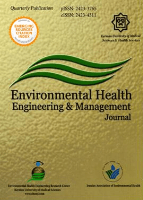
Environmental Health Engineering and Management Journal
Advancing the Nexus of Environment and HealthEnvironmental Health Engineering and Management Journal is a premier platform dedicated to the dissemination of research findings in the essential field of environmental health. Published by Kerman University of Medical Sciences in Iran, this Open Access journal has been a beacon of scientific inquiry since its inception in 2014. With an ISSN of 2423-3765 and E-ISSN 2423-4311, it facilitates broad accessibility to cutting-edge research that addresses the complex interactions between environmental factors and human health. With a notable categorization in the Q3 quartile for Environmental Science and Public Health, alongside Q4 in Chemical Health and Safety, the journal underscores its commitment to quality and relevance. Currently ranked #132 out of 233 in Environmental Science within Scopus, it serves as a crucial resource for researchers and practitioners striving to tackle contemporary environmental challenges. The journal's scope includes innovative methodologies, environmental risk assessment, and sustainable health practices, positioning it as an indispensable reference for those invested in improving public health outcomes through environmental engineering and management.

Marine Pollution Bulletin
Advancing knowledge on marine ecosystems.Marine Pollution Bulletin is a premier interdisciplinary journal dedicated to publishing innovative research and critical reviews focused on the impact of human activities on marine ecosystems. Published by PERGAMON-ELSEVIER SCIENCE LTD, this journal is renowned for its rigorous peer-review process and holds a prestigious position in the academic community, with a 2023 Q1 ranking in Aquatic Science, Oceanography, and Pollution. With a history spanning from 1970 to 2024, it provides a vital platform for researchers, professionals, and students alike to share groundbreaking findings in marine environmental science. The journal, based in the United Kingdom at The Boulevard, Langford Lane, Kidlington, Oxford OX5 1GB, England, is indexed in Scopus and ranks impressively in various categories, underscoring its significance in advancing the understanding of marine pollutants and their ecological consequences. Submissions are encouraged for original research, review articles, and case studies that contribute to this critical field, enabling the academic community to explore solutions for mitigating marine pollution.
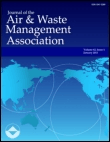
JOURNAL OF THE AIR & WASTE MANAGEMENT ASSOCIATION
Advancing Environmental Solutions for a Sustainable FutureJOURNAL OF THE AIR & WASTE MANAGEMENT ASSOCIATION is a leading publication in the fields of environmental science, pollution control, and waste management, published by Taylor & Francis Inc in the United Kingdom. With an impressive history of publication dating back to 1989 and a commitment to advancing knowledge and practice in these critical areas, this journal serves as a valuable resource for researchers, professionals, and students alike. It holds a 2023 impact factor reflected through its competitive rankings in four distinct categories: Q3 in Atmospheric Science and Q2 in Management, Monitoring, Policy and Law, Pollution, and Waste Management and Disposal. The journal's dedication to disseminating innovative research and best practices plays a vital role in enhancing environmental policies and strategies globally. Although not currently Open Access, the journal is accessible through its ISSN 1096-2247 and E-ISSN 2162-2906, providing opportunities for rich academic discussion and collaboration in addressing pressing environmental challenges.

Geography and Natural Resources
Innovating Solutions for a Sustainable PlanetGeography and Natural Resources is a vital academic journal published by MAIK NAUKA/INTERPERIODICA/SPRINGER, focusing on diverse aspects of geography, natural resource management, and environmental sciences. With its ISSN 1875-3728 and E-ISSN 1875-371X, the journal serves as a platform for scholars and researchers to disseminate their findings in a rapidly evolving field. The journal holds a respectable Q3 ranking in the categories of Earth-Surface Processes and Geography, Planning and Development, as well as a Q4 ranking in Management, Monitoring, Policy, and Law, reflecting its commitment to quality research. Although it is not an open-access journal, it offers valuable insights and impactful articles tailored for professionals and academics interested in the intersection of human and environmental systems. By bridging theoretical and practical applications, Geography and Natural Resources plays a crucial role in guiding policies and enhancing understanding of sustainable development from 2008 to 2024 and beyond, making it an indispensable resource for the global scholarly community.

International Journal of Environmental Science and Technology
Empowering researchers to shape environmental solutions.International Journal of Environmental Science and Technology, published by SPRINGER, stands as a premier platform for the dissemination of cutting-edge research in the fields of environmental science, technology, and engineering. With an impressive scope spanning from 2005 to 2024, this journal serves as a vital resource for academic and professional communities engaged in tackling pressing environmental challenges. It boasts a strong reputation, evidenced by its Q1 ranking in Agricultural and Biological Sciences and solid placements in Environmental Chemistry and Engineering. Researchers searching for high-impact studies will find the journal's contributions significant, as reflected in its rankings within Scopus: 34th percentile in Agricultural and Biological Sciences and notable standings in Environmental Engineering and Chemistry. Although the journal is not currently an Open Access resource, it maintains a commitment to academic rigor and innovation, making it indispensable for those devoted to advancing knowledge in environmental sustainability and technology.
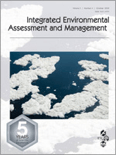
Integrated Environmental Assessment and Management
Pioneering rigorous research at the intersection of geography and environmental science.Integrated Environmental Assessment and Management, published by Wiley, stands at the forefront of interdisciplinary research in the fields of environmental science and geography. With an impact factor reflective of its significant contribution to the academic community, this journal is categorized as Q2 in Environmental Science, Q1 in Geography, Planning and Development, and Q2 in Medicine as of 2023. Covering a broad spectrum of topics, it facilitates the integration of assessment and management practices crucial to addressing contemporary environmental challenges. As of the convergence years from 2005 to 2024, the journal has consolidated its reputation, holding notable ranks in Scopus, including #121 in the Social Sciences—Geography, Planning and Development category and #62 in General Environmental Science. While this journal does not currently operate under an open access model, it remains an essential resource for researchers, professionals, and students who seek to enhance their understanding of environmental and geographical issues through rigorous scientific inquiry.
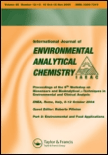
INTERNATIONAL JOURNAL OF ENVIRONMENTAL ANALYTICAL CHEMISTRY
Connecting science to global environmental challenges.INTERNATIONAL JOURNAL OF ENVIRONMENTAL ANALYTICAL CHEMISTRY, published by Taylor & Francis Ltd, stands as an essential resource in the interdisciplinary field of environmental science and analytical chemistry. With a history dating back to 1971 and a convergence period extending to 2024, this journal addresses urgent global challenges by providing a platform for high-quality research that encompasses pivotal aspects of environmental analysis, pollution, and public health. The journal’s significant impact is reflected in its 2023 rankings, placing it in the second and third quartiles across various relevant categories, including Analytical Chemistry, Environmental Chemistry, and Water Science and Technology. Researchers and practitioners are encouraged to contribute to its wealth of knowledge, making it a vital reference for emerging studies in Health, Toxicology and Mutagenesis and beyond. Although it is not an open-access journal, subscriptions provide unparalleled access to groundbreaking research that can influence both academia and industry practices.
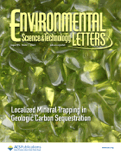
Environmental Science & Technology Letters
Transforming research into actionable environmental solutions.Environmental Science & Technology Letters, published by the American Chemical Society, stands as a premier journal in the realm of environmental science and technology, focusing on pivotal studies that address pressing environmental challenges. With an impressive Q1 ranking in multiple categories including Ecology, Environmental Chemistry, and Pollution, this journal maintains a position of excellence within its field, achieving Scopus ranks that place it in the top percentile of Environmental Science disciplines. Although not open access, Environmental Science & Technology Letters offers vital insights and cutting-edge research that contribute significantly to the understanding and management of environmental issues. The journal’s objectives include disseminating ground-breaking findings and promoting discussions that lead to sustainable solutions. With convergence from 2013 to 2024, it continues to serve as an essential resource for researchers, professionals, and students committed to advancing knowledge and innovation in environmental science.
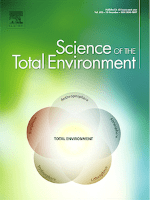
Science of The Total Environment
Connecting Science and Sustainability for a Better TomorrowScience of The Total Environment, an esteemed journal published by Elsevier, holds a significant position in the field of environmental science, encompassing critical areas such as Environmental Chemistry, Environmental Engineering, Pollution, and Waste Management and Disposal. With an impressive impact factor and ranked in the Q1 quartile across its categories for 2023, the journal is recognized for its high-quality research output and contribution to environmental sustainability. Operating from its base in the Netherlands, the journal has been a valuable resource since its inception in 1972, welcoming innovative studies that address complex environmental challenges. Its notable rankings—such as Rank #9 in both Environmental Sciences and Pollution—underscore its relevance and influence in the academic community. Although the journal currently does not provide an open access option, the robust findings and discussions presented within its pages continue to foster a deeper understanding of environmental issues. Science of The Total Environment is an essential platform for researchers, professionals, and students dedicated to advancing knowledge and solutions in the rapidly evolving field of environmental science.
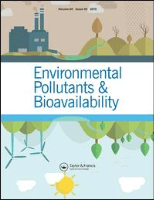
Environmental Pollutants and Bioavailability
Transforming Knowledge into Environmental ActionEnvironmental Pollutants and Bioavailability, published by Taylor & Francis Ltd, serves as a critical platform for disseminating high-quality research focused on the interactions between environmental contaminants and biological systems. Since its inception as an Open Access journal in 2019, it has rapidly gained recognition within the scientific community, achieving a commendable Q2 ranking in multiple categories including Chemical Health and Safety, Health, Toxicology and Mutagenesis, and Toxicology for the year 2023. The journal aims to bridge the gap between environmental science and public health by exploring innovative methodologies, risk assessments, and bioavailability studies related to pollutants. Located in the United Kingdom, Environmental Pollutants and Bioavailability is positioned to impact ongoing discourse and research practices in the fields of toxicology and environmental safety, making it an invaluable resource for researchers, professionals, and students dedicated to advancing knowledge in these critical areas.